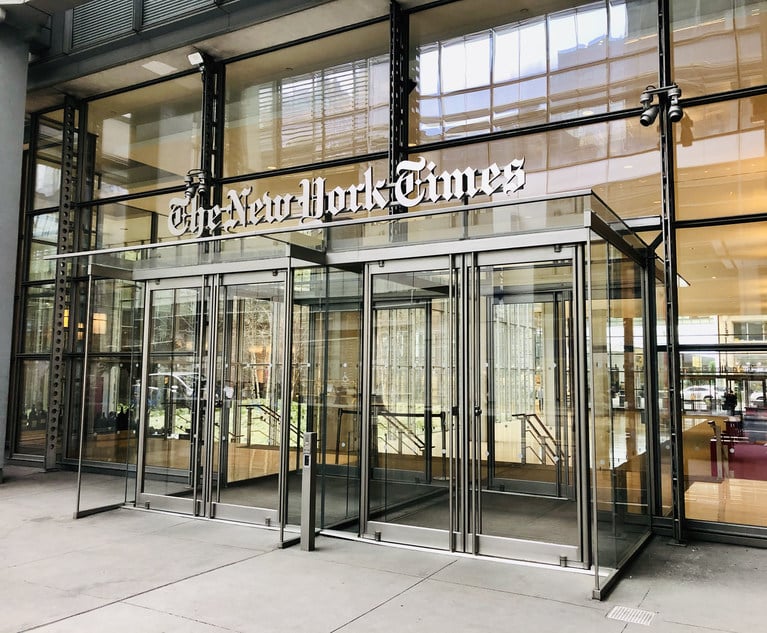 Dentist's office/photo by Nedopekin Yuriy/iStockphoto.com
Dentist's office/photo by Nedopekin Yuriy/iStockphoto.comAttorneys File New Complaint Against NY Health Department in Medical Dental Lawsuit
The revused lawsuit adds six new individuals who claim the state's policy for covering certain dental services violates the federal Medicaid Act and other laws.
October 31, 2018 at 03:11 PM
6 minute read
Attorneys representing Medicaid recipients in a lawsuit against the New York state Department of Health argued in a new filing that new regulations promulgated to ease restrictions on dental coverage for those individuals don't go far enough to permanently assist their clients or those similarly situated.
The lawsuit, which started with two named plaintiffs, was also revised to add six new individuals who claim the state's policy for covering certain dental services violates the federal Medicaid Act and other laws.
The attorneys in the case are Belkys Garcia, a staff attorney at the Legal Aid Society, and Willkie Farr & Gallagher partners Mary Eaton and Wes Powell. Other attorneys at LAS are also on the case, along with Timothy Fleming, an associate at Willkie. They were not immediately available on Wednesday to discuss the amended complaint.
They now have to refile their motion to certify a class in the lawsuit since their complaint was amended. That motion is expected sometime over the next week.
The lawsuit was initially brought on behalf of Frank Ciaramella and Richard Palazzolo, both Medicaid recipients who live in New York City and Suffolk County, respectively. Both men were covered for dentures by Medicaid but either lost them or were unable to use them.
That was the case with Ciaramella, whose upper dentures never fit and lower dentures were run over by a car when they fell out of his mouth. Palazzolo claimed his dentures were stolen while he was living in a supportive housing facility.
When both plaintiffs initially tried to get new dentures, the state denied them Medicaid coverage for services that would allow them to be replaced. Ciaramella required new dental implants so his dentures would fit, for example. Both men were also denied coverage based on a rule from the state that replacement dentures would only be covered every eight years.
New York state officials have since promulgated a new regulation that allows more flexibility for Medicaid recipients to have replacement dentures covered within the eight-year period.
The regulation allows coverage if patients provide two letters—one from their physician and one from their dentist—explaining why a dental implant or replacement set of dentures is medically necessary. For dentures, the letters have to explain why the replacements are necessary and how they will improve a serious health condition and the chance at getting a job. For implants, the letters must explain why an alternative treatment cannot be used and how it would improve the patient's health. The changes take effect Nov. 12.
The state also agreed to a settlement with Ciaramella earlier this month, allowing him coverage for dental implants and replacement dentures. The Health Department even offered to foot the bill if Fidelis Care, his insurer through Medicaid, rejects the claim.
The problem, the attorneys for the plaintiffs said, is that the rule places an unnecessary onus on patients such as Palazzolo, whose dentures are medically necessary but need to be replaced for other reasons.
“This provision would impose a more stringent burden on Medicaid recipients whose dentures have become unserviceable through disease or trauma than demonstrating medical necessity,” the attorneys said.
They also argued in the amended complaint that the state's treatment of such claims deserves judicial review because the newly revised policy could be reversed at any point, or modified further. A court decision ordering the state to provide dental coverage with less hoops to jump through would, instead, be binding unless otherwise legislated, they argued.
“Although the Proposed Revised Manual is set to take effect November 12, 2018, DOH has supplied no express guarantee that the changes contained therein will be maintained permanently, and DOH is under no legal obligation to adhere to the Proposed Revised Manual,” the complaint said. “Rather, DOH retains full discretion to change the Proposed Revised Manual in the future.”
Their claims also go further than Medicaid coverage for replacement dentures and dental implants in the amended complaint. Two of the new plaintiffs in the lawsuit were denied coverage for root canals recommended by their dentists in favor of having the teeth extracted under the state's rules, the complaint said.
As such, the lawsuit now also specifically requests that the court order the Health Department to modify its rules to provide Medicaid coverage for medically necessary root canals and crowns. That specific demand wasn't in the original complaint.
The other four new plaintiffs in the case sought coverage for either new implants or dentures and were denied, much like Ciaramella and Palazzolo.
Christopher Russo, for example, lost his dentures during a visit to the hospital when they were thrown away by mistake, according to the complaint. His attorneys claim that he may not meet the revised requirements for replacement dentures because the policy requires a letter from his physician explaining how dentures would alleviate a health condition or improve his chances at getting a job. He is not being treated for a serious health condition that would be improved by dentures, they said.
A spokesman for the state Health Department declined to comment on the pending litigation but said the agency will continue to work with Medicaid recipients on their dental and medical needs.
“The new Medicaid dental guidelines will enhance New York State's already nation-leading Medicaid coverage of dentures and dental implants. We cannot comment on pending litigation, but will continue to work with all Medicaid-eligible New Yorkers to make sure their dental and medical needs are met,” the spokesman said.
READ MORE:
This content has been archived. It is available through our partners, LexisNexis® and Bloomberg Law.
To view this content, please continue to their sites.
Not a Lexis Subscriber?
Subscribe Now
Not a Bloomberg Law Subscriber?
Subscribe Now
NOT FOR REPRINT
© 2025 ALM Global, LLC, All Rights Reserved. Request academic re-use from www.copyright.com. All other uses, submit a request to [email protected]. For more information visit Asset & Logo Licensing.
You Might Like
View All
New York Times Moves for $100K in Attorney Fees Against Dfinity Foundation
3 minute read
Federal Judge Slaps Down the SEC’s Attempt to Regulate Crypto Liquidity Providers
10 minute read
A Client Is Guilty; But Another Man Is Wrongfully Convicted

Trending Stories
- 1The Fearless Forecaster’s Employment Law Predictions for 2025
- 2Judicial Conference Declines Democratic Request to Refer Justice Thomas to DOJ
- 3People in the News—Jan. 2, 2025—Eastburn and Gray, Klehr Harrison
- 4Deal Watch: Latham, Paul Weiss, Debevoise Land on Year-End Big Deals. Plus, Mixed Messages for 2025 M&A
- 5Bathroom Recording Leads to Lawyer's Disbarment: Disciplinary Roundup
Who Got The Work
Michael G. Bongiorno, Andrew Scott Dulberg and Elizabeth E. Driscoll from Wilmer Cutler Pickering Hale and Dorr have stepped in to represent Symbotic Inc., an A.I.-enabled technology platform that focuses on increasing supply chain efficiency, and other defendants in a pending shareholder derivative lawsuit. The case, filed Oct. 2 in Massachusetts District Court by the Brown Law Firm on behalf of Stephen Austen, accuses certain officers and directors of misleading investors in regard to Symbotic's potential for margin growth by failing to disclose that the company was not equipped to timely deploy its systems or manage expenses through project delays. The case, assigned to U.S. District Judge Nathaniel M. Gorton, is 1:24-cv-12522, Austen v. Cohen et al.
Who Got The Work
Edmund Polubinski and Marie Killmond of Davis Polk & Wardwell have entered appearances for data platform software development company MongoDB and other defendants in a pending shareholder derivative lawsuit. The action, filed Oct. 7 in New York Southern District Court by the Brown Law Firm, accuses the company's directors and/or officers of falsely expressing confidence in the company’s restructuring of its sales incentive plan and downplaying the severity of decreases in its upfront commitments. The case is 1:24-cv-07594, Roy v. Ittycheria et al.
Who Got The Work
Amy O. Bruchs and Kurt F. Ellison of Michael Best & Friedrich have entered appearances for Epic Systems Corp. in a pending employment discrimination lawsuit. The suit was filed Sept. 7 in Wisconsin Western District Court by Levine Eisberner LLC and Siri & Glimstad on behalf of a project manager who claims that he was wrongfully terminated after applying for a religious exemption to the defendant's COVID-19 vaccine mandate. The case, assigned to U.S. Magistrate Judge Anita Marie Boor, is 3:24-cv-00630, Secker, Nathan v. Epic Systems Corporation.
Who Got The Work
David X. Sullivan, Thomas J. Finn and Gregory A. Hall from McCarter & English have entered appearances for Sunrun Installation Services in a pending civil rights lawsuit. The complaint was filed Sept. 4 in Connecticut District Court by attorney Robert M. Berke on behalf of former employee George Edward Steins, who was arrested and charged with employing an unregistered home improvement salesperson. The complaint alleges that had Sunrun informed the Connecticut Department of Consumer Protection that the plaintiff's employment had ended in 2017 and that he no longer held Sunrun's home improvement contractor license, he would not have been hit with charges, which were dismissed in May 2024. The case, assigned to U.S. District Judge Jeffrey A. Meyer, is 3:24-cv-01423, Steins v. Sunrun, Inc. et al.
Who Got The Work
Greenberg Traurig shareholder Joshua L. Raskin has entered an appearance for boohoo.com UK Ltd. in a pending patent infringement lawsuit. The suit, filed Sept. 3 in Texas Eastern District Court by Rozier Hardt McDonough on behalf of Alto Dynamics, asserts five patents related to an online shopping platform. The case, assigned to U.S. District Judge Rodney Gilstrap, is 2:24-cv-00719, Alto Dynamics, LLC v. boohoo.com UK Limited.
Featured Firms
Law Offices of Gary Martin Hays & Associates, P.C.
(470) 294-1674
Law Offices of Mark E. Salomone
(857) 444-6468
Smith & Hassler
(713) 739-1250






